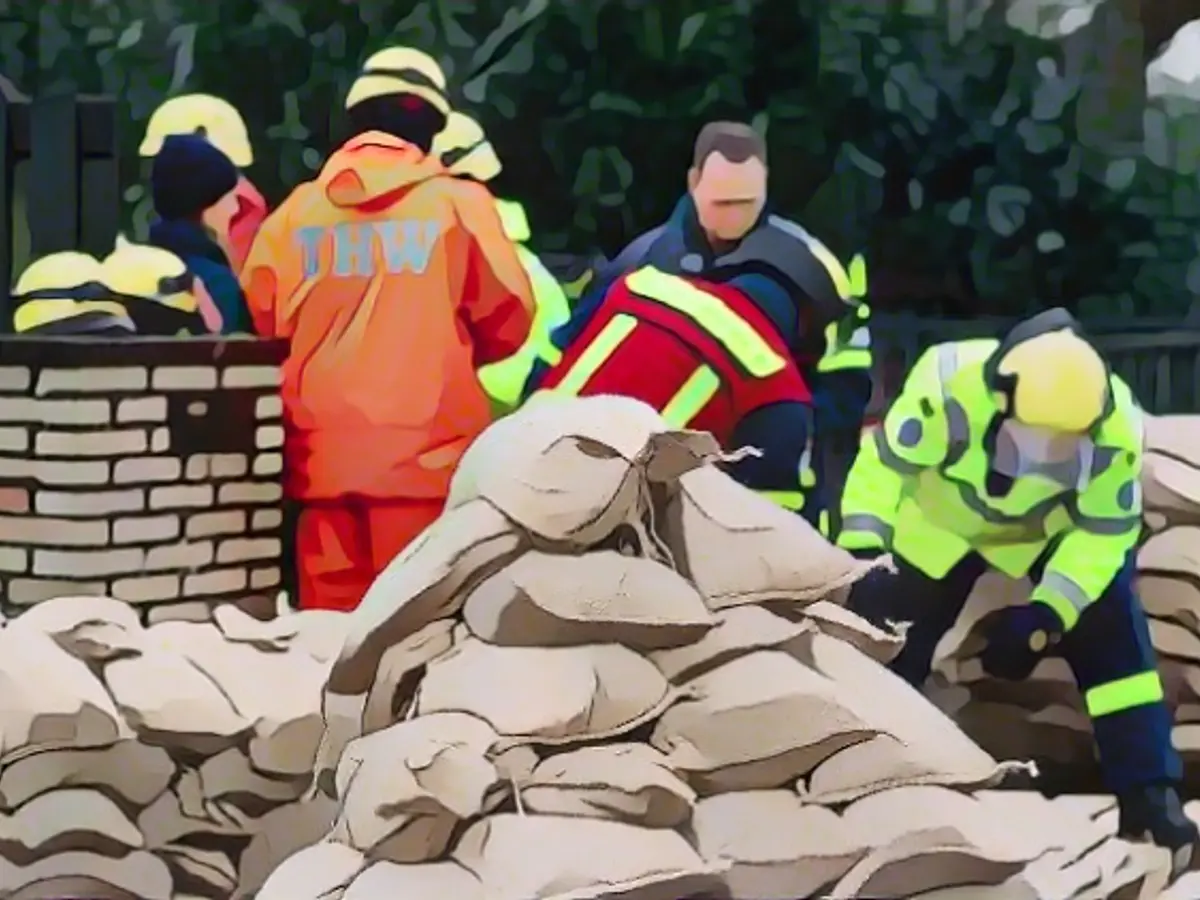Lower Saxony runs out of its own sandbags
Last night was largely calm in northern Germany despite widespread continuous rain. However, the situation remains critical. One expert questions whether the current flood protection system will still work in the future and gives a gloomy forecast.
Lower Saxony is now also drawing on reserves of sandbags from other federal states to combat flooding. Apart from a small remainder, the state's own reserve of around 1.9 million sandbags stored since the start of the flood situation before Christmas has now been used up, according to the responsible State Agency for Water Management, Coastal Defence and Nature Conservation (NLWKN). However, the state has now received around 1.5 million more sandbags from other federal states.
The Ministry of the Interior in Hanover has organized these sandbags via the Joint Reporting and Situation Centre of the federal and state governments. North Rhine-Westphalia is helping with around 500,000 sandbags, Mecklenburg-Western Pomerania with around 330,000, around 250,000 sandbags are coming from Schleswig-Holstein and around 400,000 bags from Hesse.
The sandbags are used to reinforce dykes, for example. The so-called state sandbag reserve is stored by the NLWKN at around 20 locations in Lower Saxony. The filled sandbags are usually stored on pallets ready for retrieval.
Calm night in northern Germany despite continuous rain
The continuous rain is expected to continue in Bremen and Lower Saxony until Thursday night. The German Weather Service (DWD) is forecasting up to 80 liters per square meter in some areas. The night into Wednesday was calm after the predicted flooding and storms in Lower Saxony and Bremen. The police in Bremen stated on Wednesday morning that they had not been called out due to flooding. In Oldenburg, there were only a few fallen trees that were cleared.
On Tuesday, a two-kilometer-long mobile dyke was erected in Oldenburg. It was intended to protect the city should the Hunte dyke no longer be able to withstand the masses of water. According to the police, things also remained calm in Hamburg and Schleswig-Holstein. "We had a lot of rain, but nothing dramatic for us," reported the Hamburg police on Wednesday morning.
Mecklenburg-Western Pomerania said: "We don't have any problems at the moment," explained the Rostock police in the morning. The police stations in Schwerin and Neubrandenburg also reported a night without storm operations.
Expert warns of risk of repetition of long flood events
As a consequence of the floods, experts are calling for a rethink of flood protection. "In the course of climate change, where flood processes will change, we will certainly see other types of floods in the future," said Ralf Merz, hydrologist at the Helmholtz Center for Environmental Research in Halle (Saale), on Deutschlandfunk radio.
"Such long flood events will certainly occur more often in the future." Thousands of helpers have been working in several federal states for days. Lower Saxony, North Rhine-Westphalia, Saxony-Anhalt and Thuringia are particularly affected. Much of the damage could be avoided, said the hydrologist. According to Merz, consideration should be given to whether the current flood protection system still works.
"Because perhaps what we have learned from the past is not always a good measure for the future." The expert pointed out, for example, that there are now far fewer floodplains - i.e. natural floodplains. At the same time, the expert pointed out: "Of course, we will never have one hundred percent flood protection. It is not financially or technically feasible and the landscape cannot be converted.
Read also:
- Floods: water levels remain critical in many places
- Snow chaos further restricts Bavaria
- Continuous operation in the flood areas
- Flood situation remains tense in many places
Weather conditions in Mecklenburg-Vorpommern are likewise experiencing persistent rain, similar to Bremen and Lower Saxony, with the German Weather Service predicting up to 80 liters per square meter until Thursday night. Despite the continued rain, the state has not reported any flood-related incidents so far.
Lower Saxony is not the only region grappling with exhausting its sandbag reserves. The state of Bremen, facing similar weather conditions, is also seeking assistance from other federal states due to the high demand for sandbags to reinforce its dykes.
The international community is closely monitoring the ongoing flood situation in Germany. Various countries have offered resources and expertise as part of a collective effort to minimize the damage and assist affected areas.
Source: www.ntv.de






